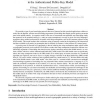Free Online Productivity Tools
i2Speak
i2Symbol
i2OCR
iTex2Img
iWeb2Print
iWeb2Shot
i2Type
iPdf2Split
iPdf2Merge
i2Bopomofo
i2Arabic
i2Style
i2Image
i2PDF
iLatex2Rtf
Sci2ools
CORR
2006
Springer
2006
Springer
Concurrently Non-Malleable Zero Knowledge in the Authenticated Public-Key Model
We consider a type of zero-knowledge protocols that are of interest for their practical applications within networks like the Internet: efficient zero-knowledge arguments of knowledge that remain secure against concurrent man-in-the-middle attacks. As negative results in the area of concurrent non-malleable zero-knowledge imply that protocols in the standard setting (i.e., under no setup assumptions) can only be given for trivial languages, researchers have studied such protocols in models with setup assumptions, such as the common reference string (CRS) model. This model assumes that a reference string is honestly created at the beginning of all interactions and later available to all parties (an assumption that is satisfied, for instance, in the presence of a trusted party). A growing area of research in Cryptography is that of reducing the setup assumptions under which certain cryptographic protocols can be realized. In an effort to reduce the setup assumptions required for efficie...
CORR 2006 | Education | Model | Setup Assumptions | Zero-knowledge |
| Added | 11 Dec 2010 |
| Updated | 11 Dec 2010 |
| Type | Journal |
| Year | 2006 |
| Where | CORR |
| Authors | Yi Deng, Giovanni Di Crescenzo, Dongdai Lin |
Comments (0)

